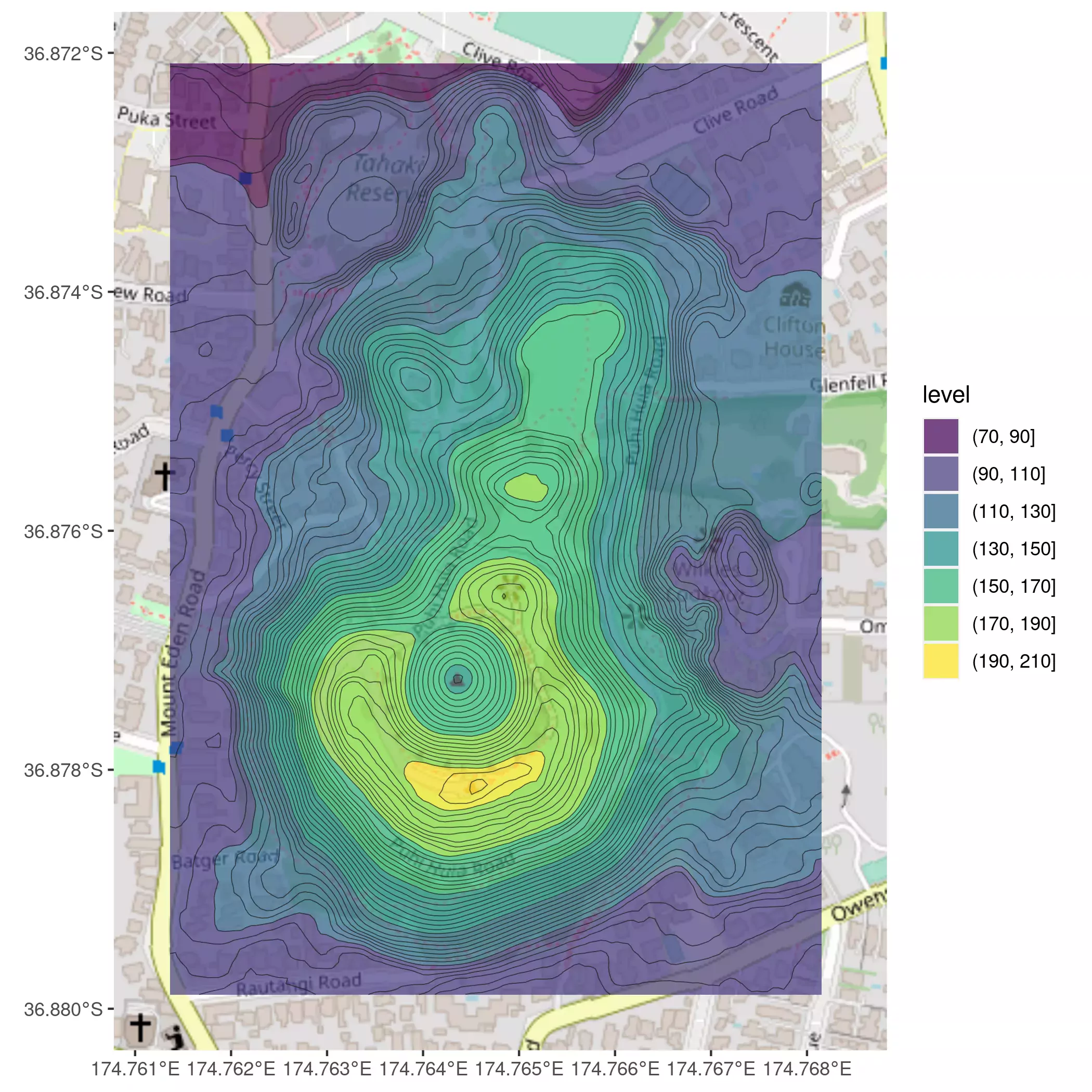If you have been playing around with R for a while, probably you are
familiarized with the volcano dataset:
data("volcano")
image(volcano, col = terrain.colors(256, rev = TRUE))
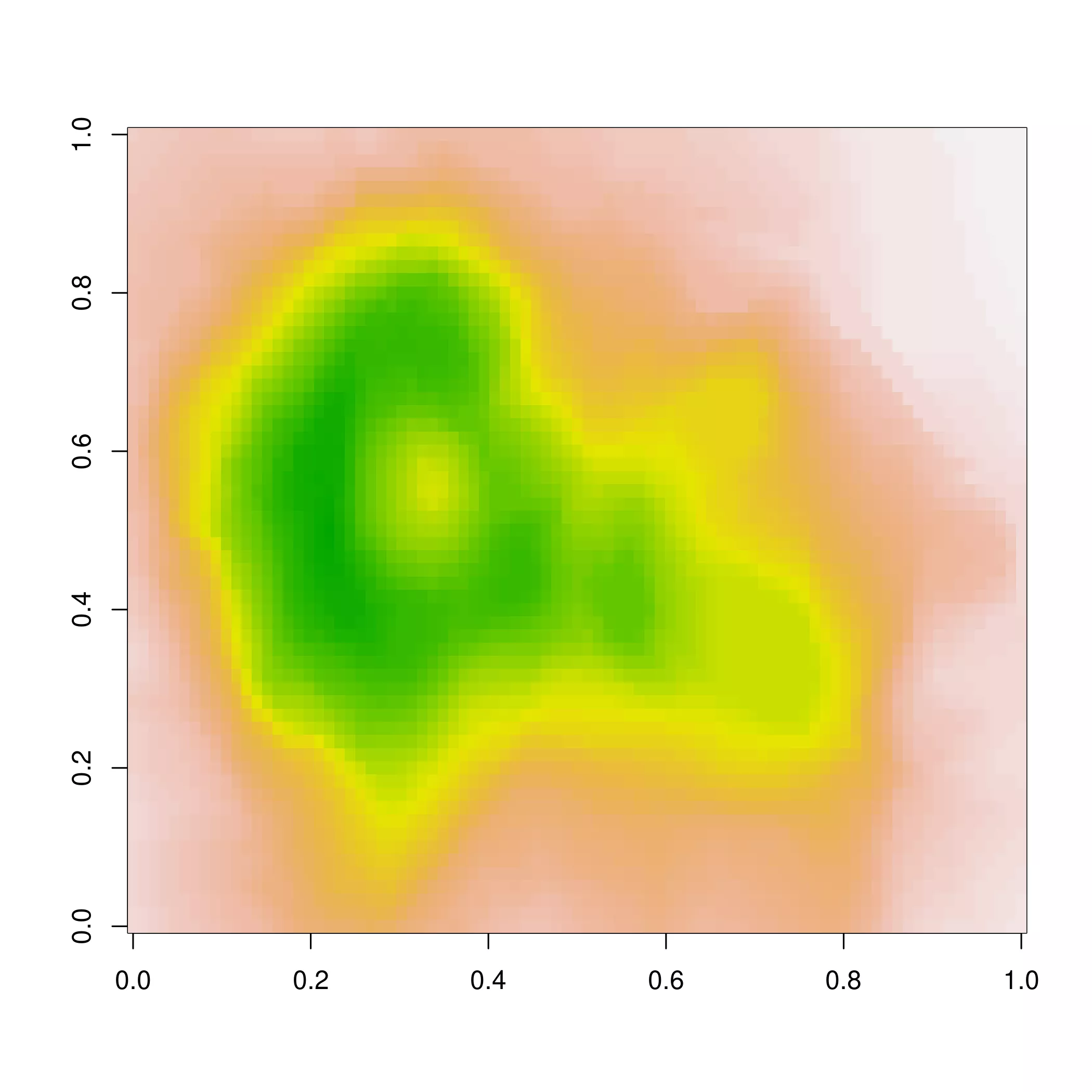
This represents the topographic information of one of the volcanoes of Auckland (New Zealand), specifically Maungawhau / Mount Eden. But do you know that this map is flipped?
On this post I introduce the tidyterra
package, recently added to
CRAN and I would show you how to
geotag the volcano dataset. We would produce also ggplot2 maps using the
functions of tidyterra.
# Libraries
library(terra)
library(ggplot2)
library(tidyterra)
library(maptiles)
library(sf)
Wait, volcano is flipped?
Let’s check it out. Thanks to the package maptiles we can have a glimpse of
the location of Maungawhau using map tiles (as Google Maps uses). We would use
tidyterra for displaying the map tile:
# location of Maungawhau
box <- c(
174.7611552780,
-36.8799200525,
174.7682380109,
-36.8719519780
)
class(box) <- "bbox"
box <- st_as_sfc(box)
st_crs(box) <- 4326
box <- box %>%
# To crs for NZGD49
st_transform(27200)
tile <- get_tiles(box, crop = TRUE, zoom = 16)
ggtile <- ggplot() +
geom_spatraster_rgb(data = tile)
ggtile
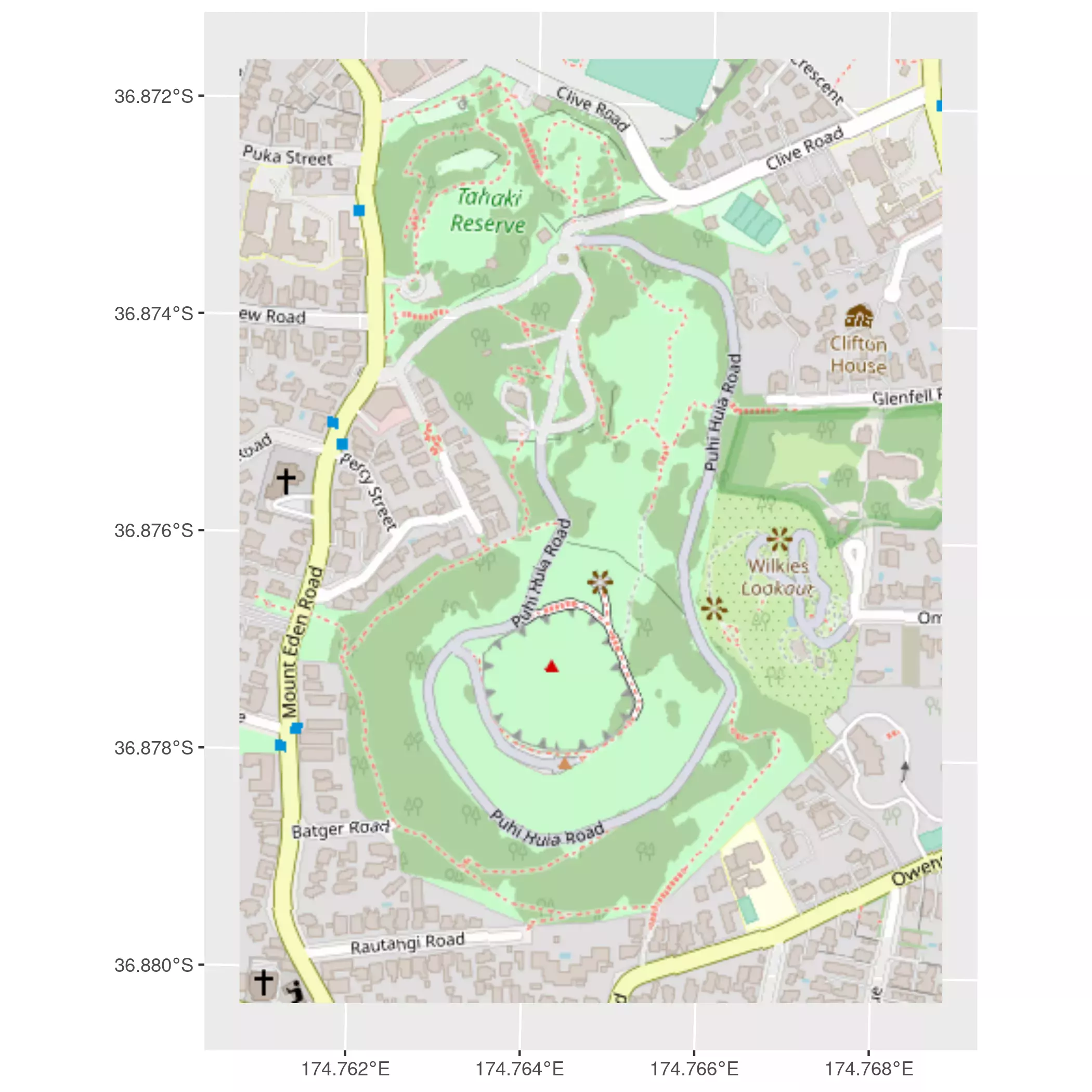
So well, here you go. A neat and crisp RGB tile of Maungawhau. Now, the next
question is, how to match the volcano dataset (a matrix) with this tile (a
geo-tagged map tile)? Let’s check it out
Working with SpatRasters
Thanks to the terra package we can start converting volcano into a
SpatRaster:
volcano_rast <- rast(volcano)
terra::plot(volcano_rast)
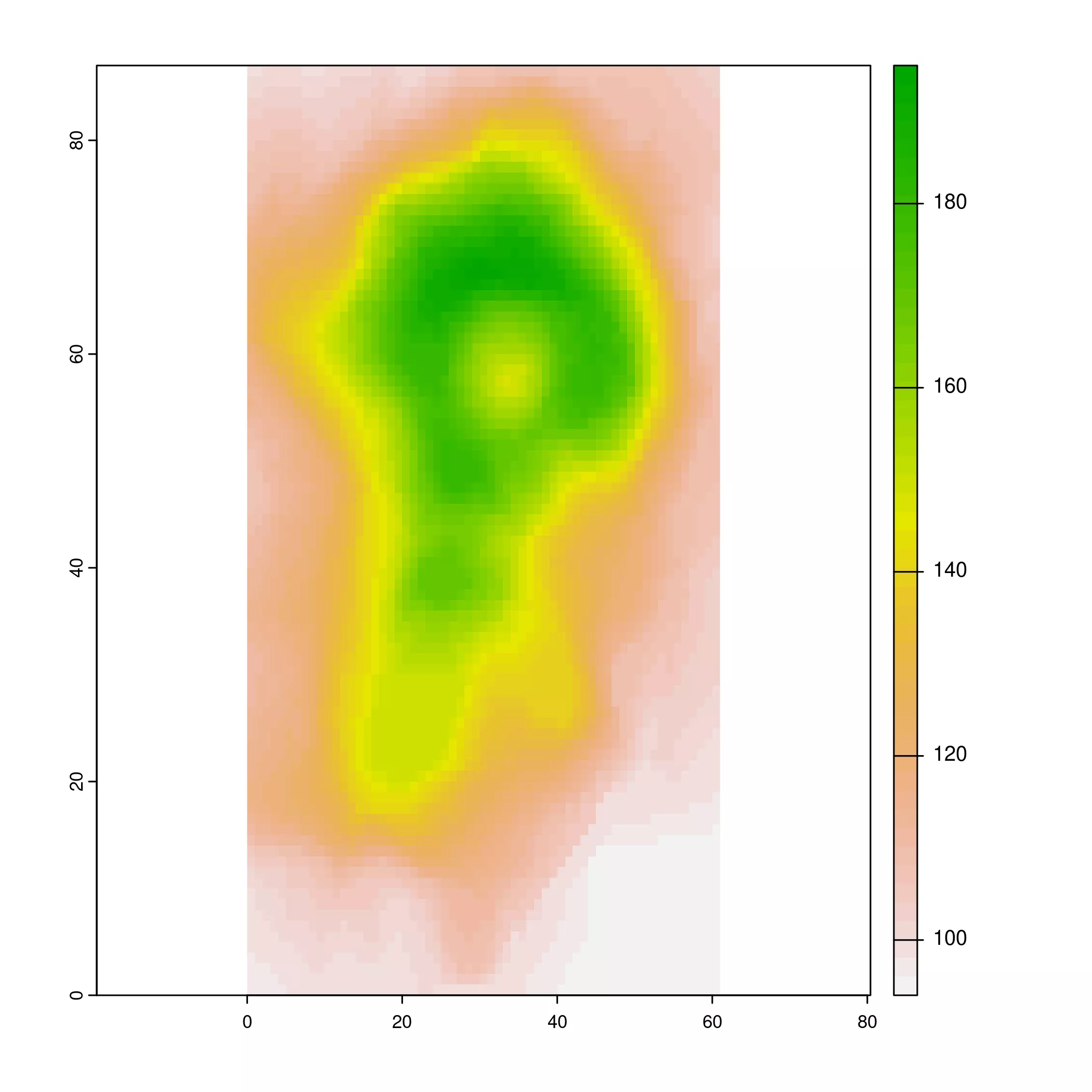
# Wait, it is flipped!
volcano_rast_ok <- rast(volcano[
seq(nrow(volcano), 1, -1),
seq(ncol(volcano), 1, -1)
])
# Much better!
terra::plot(volcano_rast_ok)
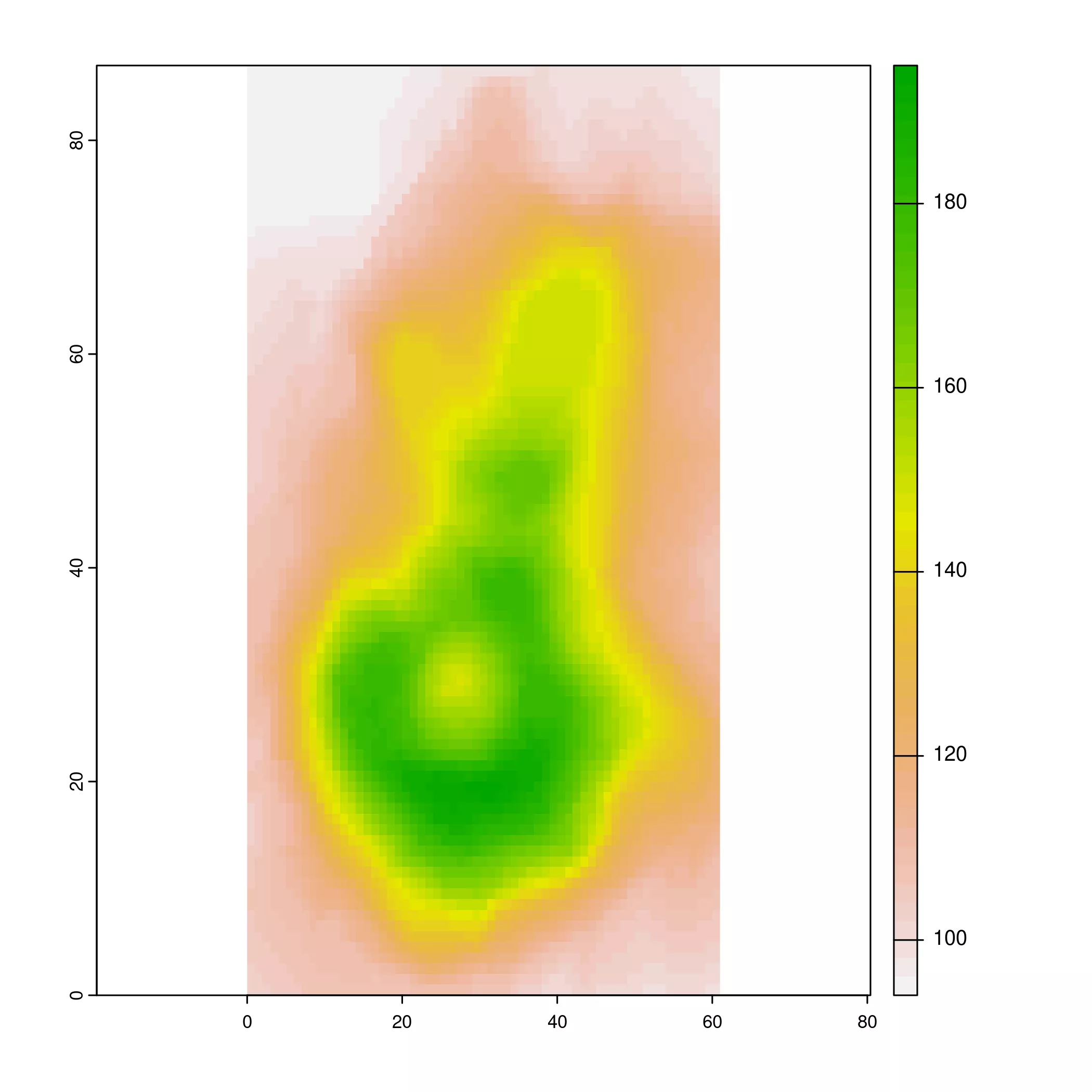
volcano_rast_ok
#> class : SpatRaster
#> dimensions : 87, 61, 1 (nrow, ncol, nlyr)
#> resolution : 1, 1 (x, y)
#> extent : 0, 61, 0, 87 (xmin, xmax, ymin, ymax)
#> coord. ref. :
#> source : memory
#> name : lyr.1
#> min value : 94
#> max value : 195
Nice! Now we have a raster of volcano, but still without geotagged
information. Thanks to this article of Tomislav Hengl
(\@tom_hengl) we can check the basic geographic
parameters of volcano (see Volcano
Maungawhau), that are:
- CRS: EPSG:27200
- xllcorner: 2667400
- yllcorner: 6478700
- cellsize: 10 m
- ncols: 61
- nrows: 87
And we can translate that easily to an empty SpatRaster:
# Extra length for proper handling extent
xrange <- range(seq(from = 2667400, length.out = 62, by = 10))
yrange <- range(seq(from = 6478700, length.out = 88, by = 10))
template <- rast(
crs = "EPSG:27200",
xmin = xrange[1],
xmax = xrange[2],
ymin = yrange[1],
ymax = yrange[2],
resolution = 10
)
template
#> class : SpatRaster
#> dimensions : 87, 61, 1 (nrow, ncol, nlyr)
#> resolution : 10, 10 (x, y)
#> extent : 2667400, 2668010, 6478700, 6479570 (xmin, xmax, ymin, ymax)
#> coord. ref. : NZGD49 / New Zealand Map Grid (EPSG:27200)
So now we only need to transfer the values from volcano_rast_ok to our
template:
# Use tidyterra for pull the values of one raster
# and create a new layer
volcano2 <- template %>%
mutate(elevation = pull(volcano_rast_ok, lyr.1)) %>%
select(elevation)
volcano2
#> class : SpatRaster
#> dimensions : 87, 61, 1 (nrow, ncol, nlyr)
#> resolution : 10, 10 (x, y)
#> extent : 2667400, 2668010, 6478700, 6479570 (xmin, xmax, ymin, ymax)
#> coord. ref. : NZGD49 / New Zealand Map Grid (EPSG:27200)
#> source : memory
#> name : elevation
#> min value : 94
#> max value : 195
terra::plot(volcano2)
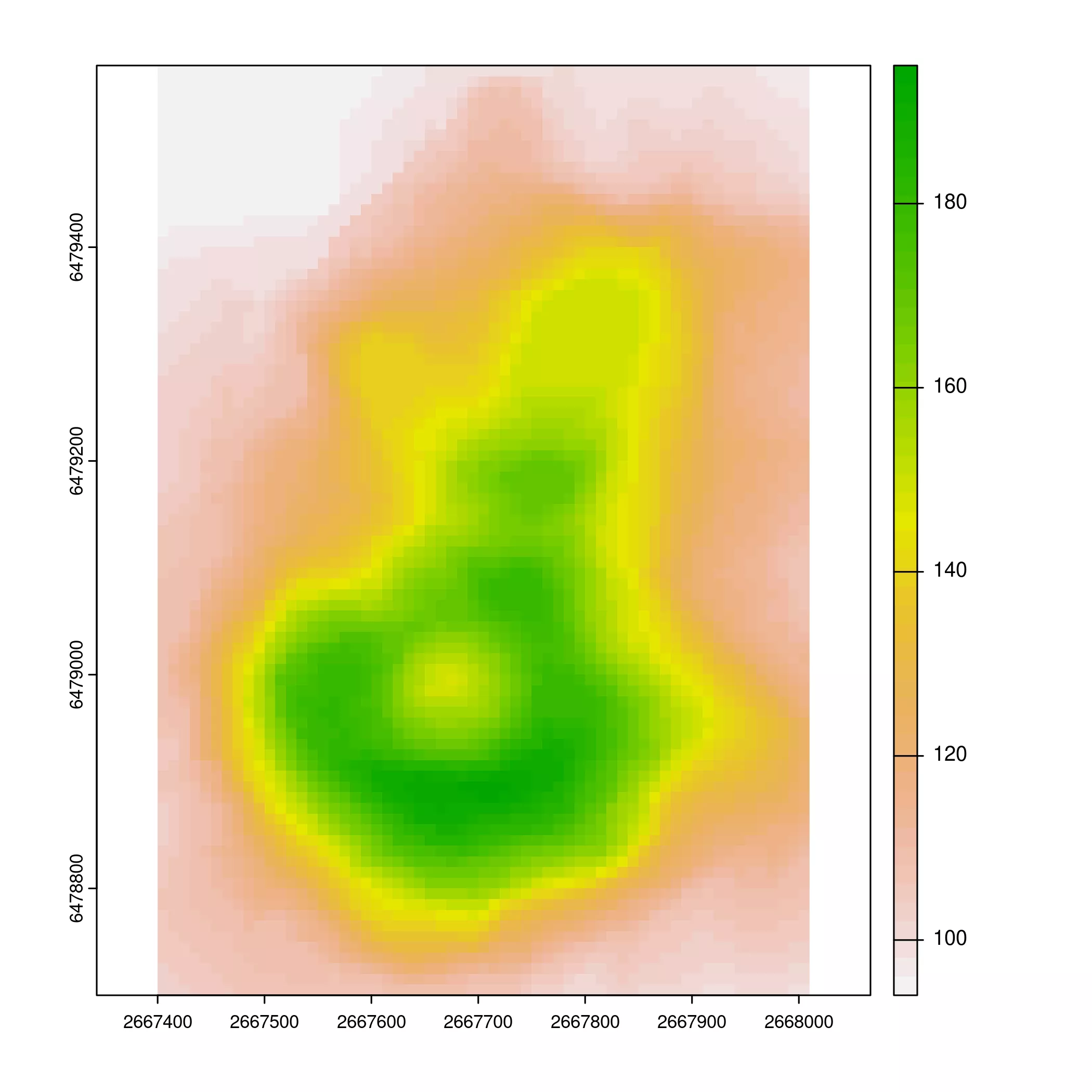
# And plot it
ggtile +
geom_spatraster(data = volcano2) +
scale_fill_terrain_c(alpha = 0.75)
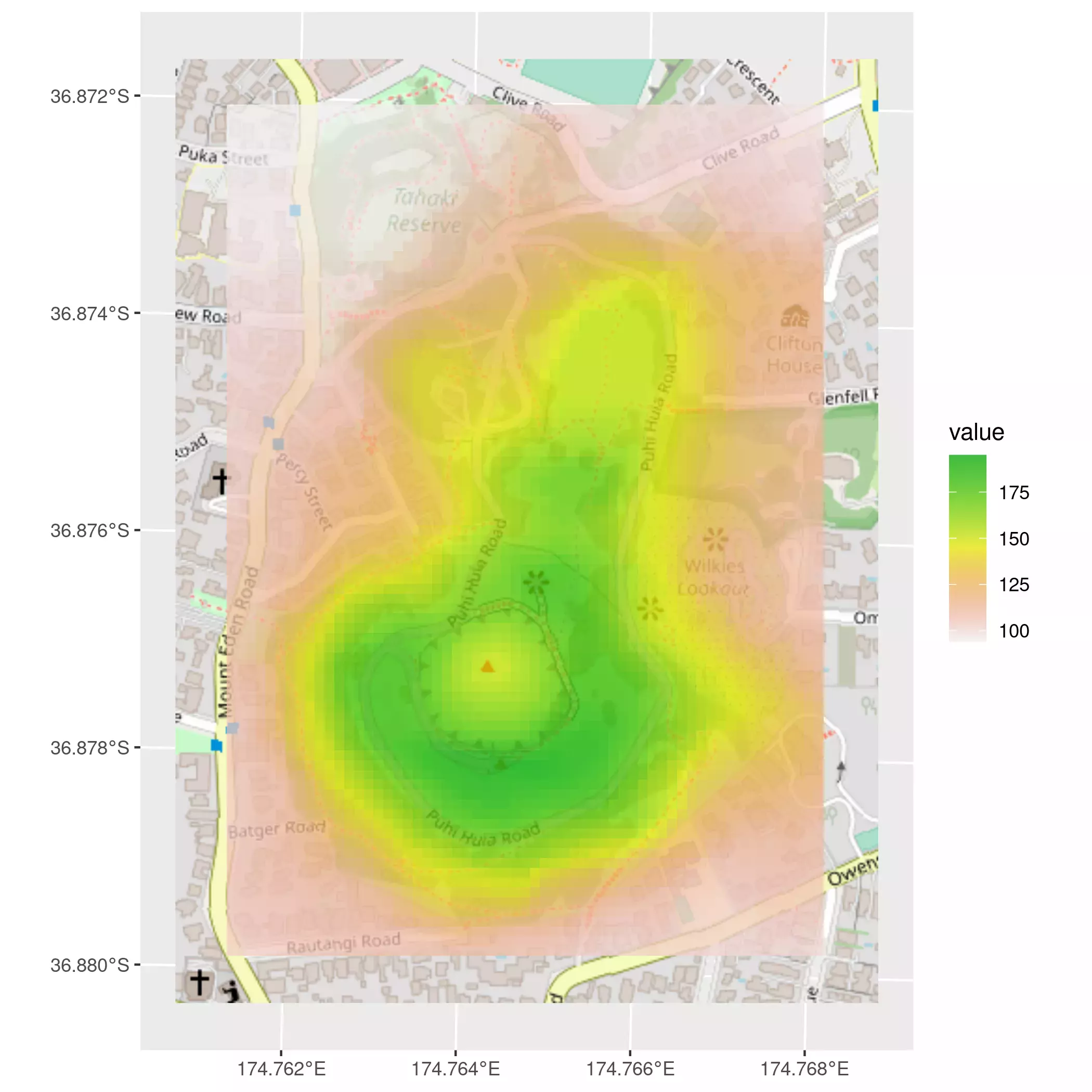
An Easter egg
The volcano dataset may not be completely up to date. As a compliment,
tidyterra includes a .tif file with the same dimensions that our volcano2
raster, but with the topographic values extracted from Auckland LiDAR 1m DEM
(2013) and
resampled to a resolution of 5x5 meters, for package size optimization. See here
how to load it and check the plotting tidyterra possibilities:
# Load out Easter Egg
volcano2_easter <- rast(system.file("extdata/volcano2.tif",
package = "tidyterra"
))
volcano2_easter
#> class : SpatRaster
#> dimensions : 174, 122, 1 (nrow, ncol, nlyr)
#> resolution : 5, 5 (x, y)
#> extent : 1756969, 1757579, 5917003, 5917873 (xmin, xmax, ymin, ymax)
#> coord. ref. : NZGD2000 / New Zealand Transverse Mercator 2000 (EPSG:2193)
#> source : volcano2.tif
#> name : elevation
#> min value : 76.26222
#> max value : 195.5542
terra::plot(volcano2_easter)
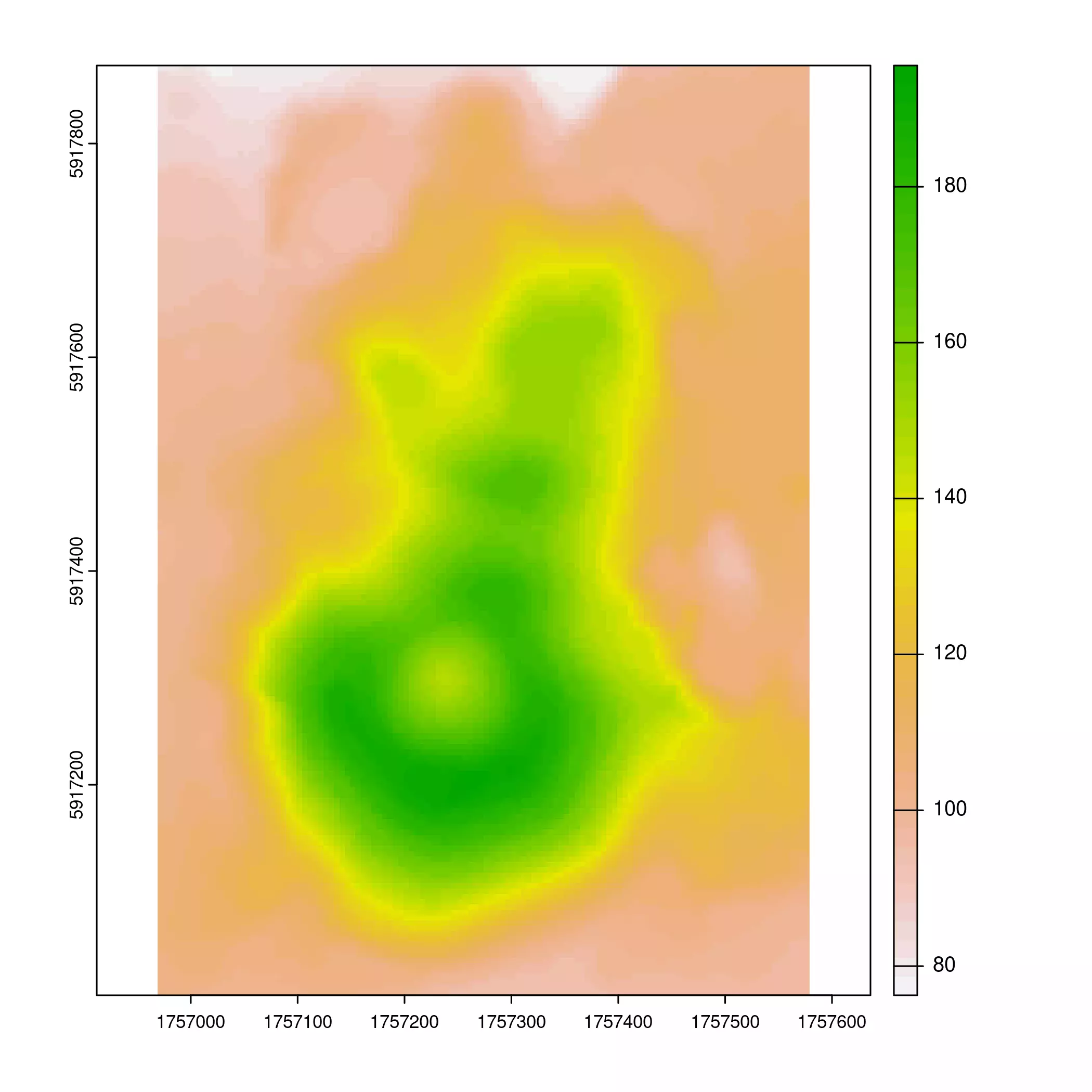
# Only altitudes of more than 130m
volcano_filter <- volcano2_easter %>%
filter(elevation > 130)
ggtile +
geom_spatraster(data = volcano_filter) +
scale_fill_viridis_c(na.value = NA, alpha = 0.7) +
labs(fill = "Elevation (m)")
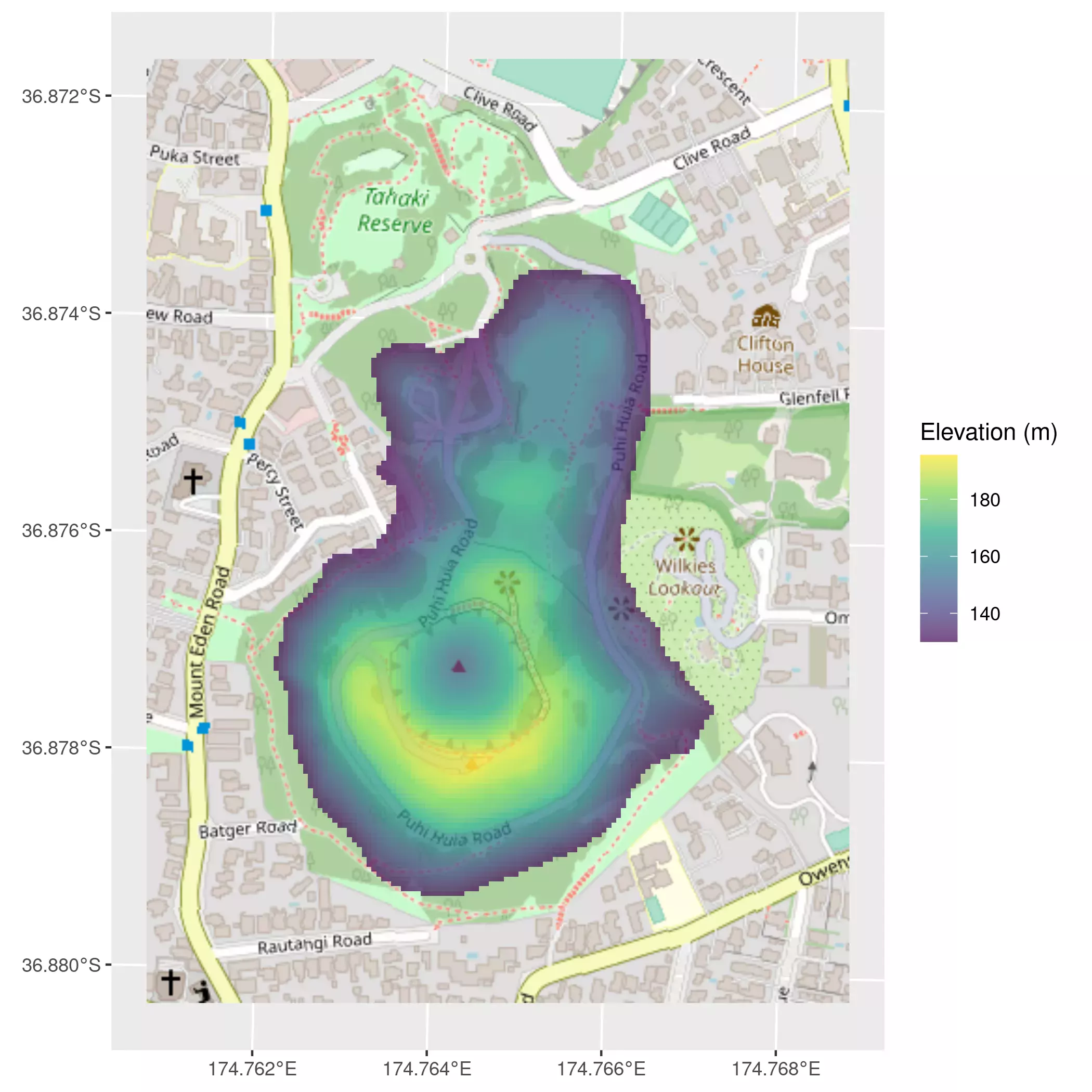
# Contour lines
ggtile +
geom_spatraster_contour(data = volcano2_easter, binwidth = 10)
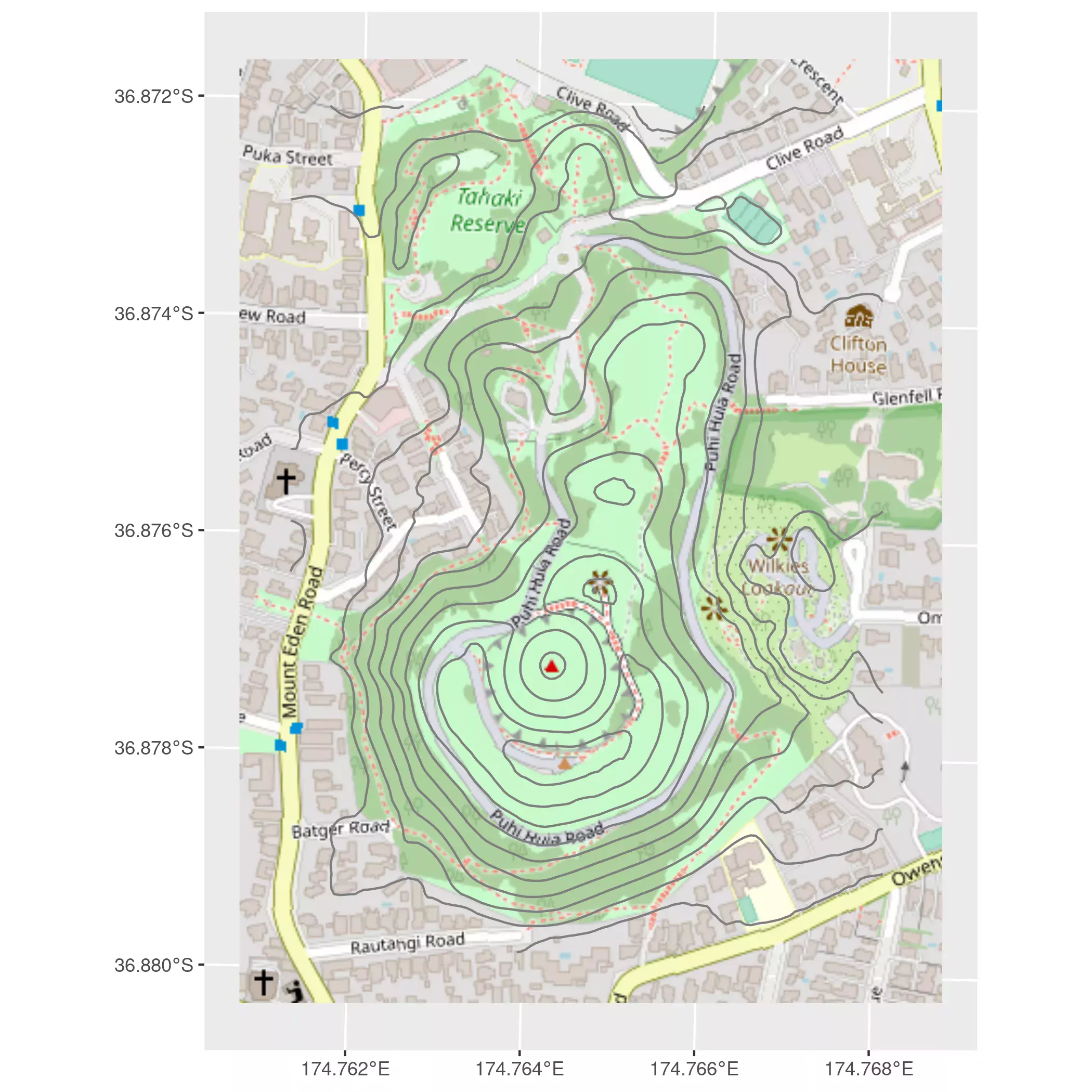
# Contour lines + contour polygons
ggtile +
geom_spatraster_contour_filled(
data = volcano2_easter,
breaks = seq(70, 210, 20),
alpha = 0.7
) +
geom_spatraster_contour(
data = volcano2_easter, binwidth = 2.5,
alpha = 0.7, size = .2, color = "grey10"
) +
coord_sf(expand = FALSE)
